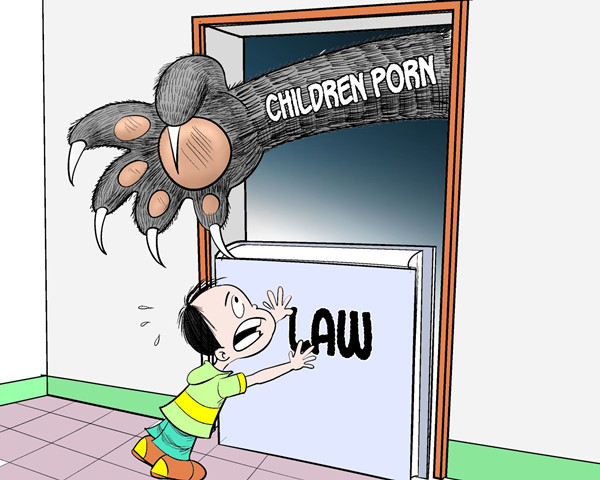Stricter laws can check child abuse
- By Xie Caifeng
 0 Comment(s)
0 Comment(s) Print
Print E-mail China Daily, October 23, 2013
E-mail China Daily, October 23, 2013
A series of child abuse cases has hit the headlines recently: four steel needles inserted into the body of a baby girl by her biological father; a seven-year-old girl drowned by her step-mother; little children in kindergarten beaten up by teachers. Such atrocities have appalled people across the country and left them wondering how children can be better protected.
|
|
|
It's not enough [By Jiao Haiyang/China.org.cn] |
Unfortunately, the existing laws are not powerful enough to ensure punishment to perpetrators or deter potential offenders. Often, police don't investigate minor child abuse cases because people generally believe that parents and teachers do have the right to physically punish a child. According to traditional thinking, the rod should not be spared when it comes to children's education, and physical punishment helps children grow up into knowledgeable, responsible and obedient adults.
So police intervene only if children suffer from serious physical injuries. In such cases, the law enforcement agencies often apply the Law of the People's Republic of China on Administrative Penalties for Public Security (or Law on Public Security). According to the law, a person could be detained for up to 15 days and fined a maximum of 1,000 yuan ($163.4) for intentionally causing physical harm to a child. But the clause is rarely invoked in a child abuse case.
The other two important child protection laws are the Law of the People's Republic of China on Protection of Minors (or Law on Protection of Minors) and the Criminal Law of the People's Republic of China (or Criminal Law). Although many clauses of the Law on Protection of Minors are devoted to protecting children's rights, it is by nature a soft law that does not advocate strict punishment, and thus plays a limited role in deterring child abuse.
The most powerful weapon against child abuse could be the Criminal Law, but it is not designed to deal with such cases. The Criminal Law only deals with the "crime of abuse", not the "crime of child abuse", and even the clauses on the crime of abuse have four inherent loopholes when it comes to deterring child abuse.
First, the law merely covers crime in the family. Non-family members such as schoolteachers and daycare center employees are thus beyond the purview of the law.
Second, only if an incident is "extremely serious" can an abuse be treated as a crime under the law.
Third, since the law sees a crime as a matter of private prosecution, the victim himself or herself has to file a case before a court of law to seek justice. Do we expect children to have the legal knowledge, let alone expertise, to move court against an abuse? Moreover, there are no public or private organizations competent enough to file a case on behalf of an abused child. The result: the "crime of child abuse" is rarely applied in child abuse cases.
And fourth, the punishment for child abuse is often very light. The offender gets away with just two years' imprisonment for even the severest of child abuse. Worse, even if the victim is tortured to death, the perpetrator can at best be imprisoned for seven years.
The story is quite different in Western counties. In the United States, and European Union and other developed countries, child abuse is a serious crime that invites the severest of punishments. Take the US for example. Child abuse cases have a wide scope, from physical abuse, emotional abuse and sexual abuse to neglect.
In June this year, a couple in the US were arrested and charged with child abuse because they spent their days playing World of Warcraft and did not fulfill the needs of and provide the appropriate living environment for their children. The couple face up to seven years in jail. Chinese people would see such a case as being intrusive on family life and unjust.
Abuse could leave a permanent scar on a child. According to the World Health Organization, a child that suffers abuse is vulnerable to many physical, emotional and behavioral conditions, such as obesity, depression, suicidal tendency, accidental pregnancy, and risky sexual behavior.
In the light of the above facts, Chinese parents and society as whole should change their mindset. They have to understand that it is not a good idea to beat up children in order to educate them.
Like their counterparts in other countries, Chinese too believe children are the future of the nation. But if they cannot provide children a safe and sound childhood, how can they expect them to grow up and lead the nation?
And despite not being the panacea against the ills of child abuse, laws can indeed be used to deter potential offenders. Therefore, to protect children from abuse, the government should amend some laws and make child abuse a crime.
The author is a fellow at the research office of Shunyi district people's court in Beijing.







Go to Forum >>0 Comment(s)